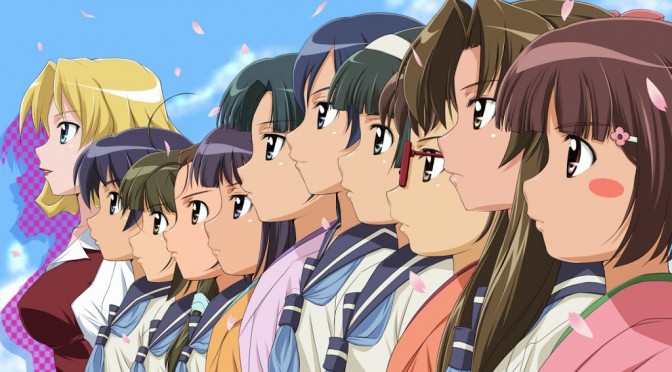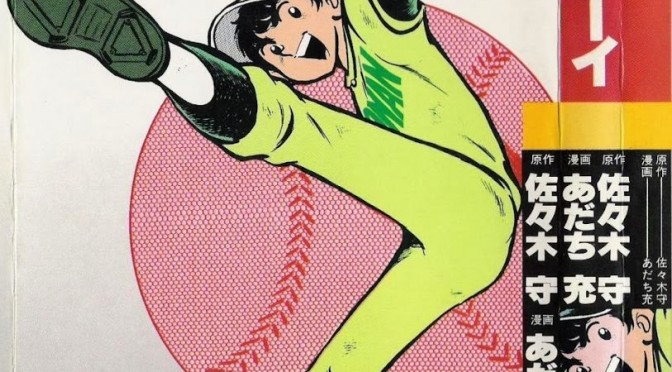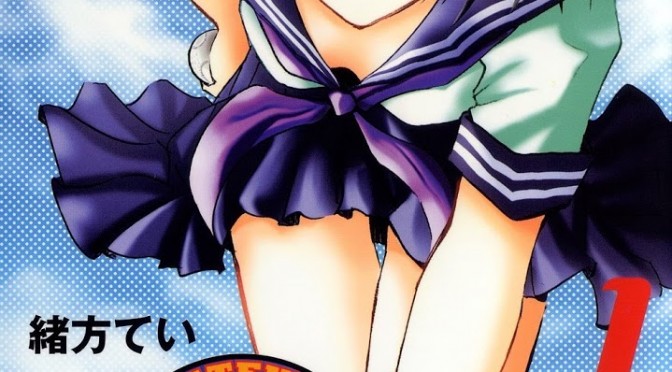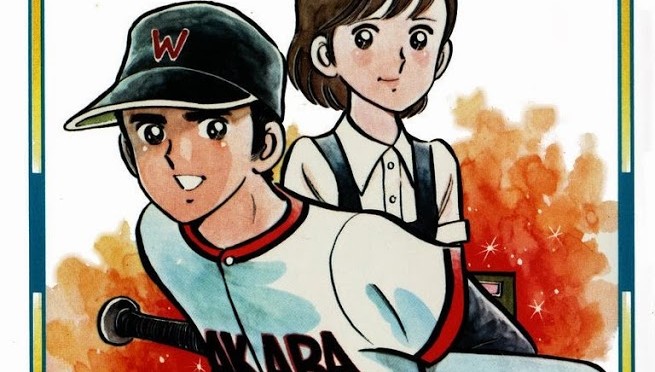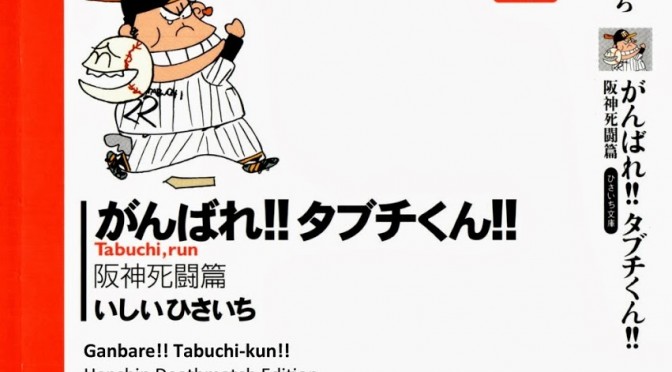Tag: baseball
Little Boy manga review
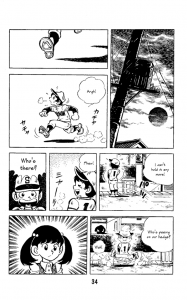 His ‘girlfriend’ Michi isn’t worth writing home about either. Gou threw one bloody ball (literally) which landed near her, and that makes her go all “I’ll follow you forever!” Michi even kicks up a stink when Gou agrees to marry another girl so the other girl can teach him a secret pitch (because that’s the kind of guy Gou is. He sucks.) The question of what she sees in him is never, ever answered. Unless it has to do with their mutual fetish for public peeing (yes, you read that right). Every Jack has his Jill, as the saying goes.
His ‘girlfriend’ Michi isn’t worth writing home about either. Gou threw one bloody ball (literally) which landed near her, and that makes her go all “I’ll follow you forever!” Michi even kicks up a stink when Gou agrees to marry another girl so the other girl can teach him a secret pitch (because that’s the kind of guy Gou is. He sucks.) The question of what she sees in him is never, ever answered. Unless it has to do with their mutual fetish for public peeing (yes, you read that right). Every Jack has his Jill, as the saying goes.
For the reasons I’ve mentioned above, Little Boy has zero merit as a romance or character-based manga. More importantly, because of the monotony of the matches, the nastiness of Gou and the colorlessness of the opposing batters, it has zero merit as a sports manga as well. The art is actually decent for a manga that old, and the action is always simple and easy to follow, but that’s as far as it goes for the positive side of this manga.
Amateur Slugger manga review
Amateur Slugger is a baseball romance drama manga, this time not about high school baseball or professional baseball but about amateur sandlot teams sponsored by local businesses. Apparently they’re quite common in shopping districts in Japan. Kousuke, a college player, plays for one of those teams. As a high school player his one claim to fame was hitting a homerun off an amazingly good pitcher during his final Koshien tournament. Now, as a sandlot player, Kousuke’s motto is “Don’t put pressure on me.”
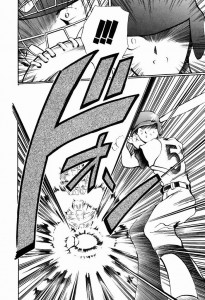 Tsukasa, on the other hand, is a fantastic pitcher. Despite being a high schooler of diminutive size, hitting her pitches is enough to train Kousuke to handle her brother Toujiro’s pitches when said Toujiro shows up to challenge him. At that point Toujiro is a major league starting pitcher, which means Tsukasa is on the major league level as far as speed and form go. This makes her one of the best pitchers in Japan (if we can believe such a thing is possible), and a shoo-in to be a softball star if she ever takes it up.
Tsukasa, on the other hand, is a fantastic pitcher. Despite being a high schooler of diminutive size, hitting her pitches is enough to train Kousuke to handle her brother Toujiro’s pitches when said Toujiro shows up to challenge him. At that point Toujiro is a major league starting pitcher, which means Tsukasa is on the major league level as far as speed and form go. This makes her one of the best pitchers in Japan (if we can believe such a thing is possible), and a shoo-in to be a softball star if she ever takes it up.Ah! Seishun no Koushien manga review
I know I’m on a baseball manga kick, but that doesn’t mean I’ll read just anything with ‘baseball’ in it. I read the first two or three chapters of volume 1, then flipped idly through the pages until volume 3 and hated it more with every passing page. After that I stopped reading it, because while I don’t hate romantic series, I do hate those with a foregone conclusion where the writers nevertheless spend way too much time trying to make us wonder “Will they or won’t they?” We know they will.
If I recall correctly, the first story was about the female manager of a baseball club. Junk-o, I think her name fittingly was. She has a crush on the pitcher Shun. Shun’s catcher Dobashi has a crush on Junk-o. Shun has a crush on Junk-o too, he just doesn’t know it yet. But he finds out pretty quickly when she forces her way in to live with him in the name of ‘taking care of him’ when his father moves to Kyushu on business. After that they just play baseball and waffle on and on for a while, and, I’m supposing, eventually get together. Whether they win the tournament or not is another issue, but the story never does anything to make you care about it. Not when the battery and their manager have nothing in their heads but romance.
The second story was even more off-putting. It started out very well with a sweet almost-romance between a girl named Natsuko and a boy named Hongo, who is in the kendo club. Wait, kendo club? But this is an Adachi series! The pitcher always gets the girl! That’s right, so it’s a foregone conclusion that he’s already lost the game. This is only confirmed when the pitcher appears in the form of a Wild Transfer Student, basically Ranma before there was a Ranma. Natsuko starts out a little prickly towards him, but we already know she’s going to waffle back and forth between the two guys and eventually pick the pitcher (because he’s the pitcher in an Adachi series) so, yeah.
I’m going to try to read something a little more drama-free next time. This crap just put me in a bad mood. I should mention before I go that I don’t dislike Adachi manga at all. I read both Cross Game and H2 with enjoyment (while the pitcher didn’t get the girl in the latter, she very definitely preferred him). He’s a great writer now, but his partner in this series, Juuzou Yamasaki, is not quite as good at creating likable characters and believable romances. I’d give this a miss unless you’re a die-hard Adachi fan who will read just about anything he has ever touched.
Ganbare!! Tabuchi-kun!! volume 1
Earlier this week, I read volume 1 of Ganbare!! Tabuchi-kun!! (がんばれ!!タブチくん!!), a 4-koma baseball manga by Ishii Hisaichi. Western fans might know him best as the guy who wrote the original manga that Studio Ghibli later adapted into “My Neighbors the Yamadas.” I’m on a baseball manga kick right now (as opposed to a real life baseball kick. I’m not that into real-life baseball), so I started this on a whim, but it turned out to be pretty good.
The most interesting thing about Tabuchi-kun – apart from the content, of course – is that it was based on the career of a real-life catcher/first baseman/cleanup hitter. In fact, “based on” is too mild. It straight up caricatured Koichi Tabuchi, right down to using his full name and team. Basically apart from his wife “Miyoko”, any named character in the manga is an actual human being.
Naturally this makes for interesting reading, but it can also make you uncomfortable when the comic gets a little mean-spirited. The whole series is aimed at pointing fun at Tabuchi, but sometimes it’s done in more cruel fashion and sometimes it’s mild and heart-warming. It’s sad to see Tabuchi booed out of the stadium or ostracized by his peers for no good reason other than that the mangaka just doesn’t like him.
It becomes even sadder when you go to J-wiki and read that the manga started right at the time when Tabuchi was playing poorly because he was recovering from a career-threatening injury that put him in the hospital for over three months and led to him gaining some weight. It’s like that tasteless “Derek Eater” headline the New York Post ran a couple of years ago, except imagine they ran that headline every week for 10 years, even long after Jeter had retired (not a Jeter fan, just saying).
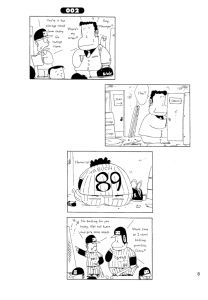
However, it turns out that the real Koichi Tabuchi is a huge, open fan of the manga and absolutely loves it. He even credits it with helping him meet his current wife, so if anything he’s grateful for its existence. So if Tabuchi isn’t mad, then I’m not mad either. No one knows what other recurring characters like Yasuda (my favorite), Suzuki, Oh and Hirooka think of the series, but since they generally come across in a better light than Tabuchi does, they probably don’t have much to complain about.
This frees me to enjoy the silly, slightly mean humor of volume 1 for all it’s worth. I’m looking forward to reading the rest, because part of the humor comes from the interplay between characters like Yasuda and Ooya, and Tabuchi and Kakefu, and much of the first volume is spent just introducing and establishing those characters.
There are 3 volumes of Ganbare!! Tabuchi-kun!! and a further 5 volumes of the follow-up, Tabuchi-kun. You don’t need to know much about Japanese baseball to enjoy this manga, though it helps to know Sadaharu Oh, current holder of the world-record in career homeruns (868) since he shows up a lot. Apart from that, just substitute your favorite team and players and enjoy.
